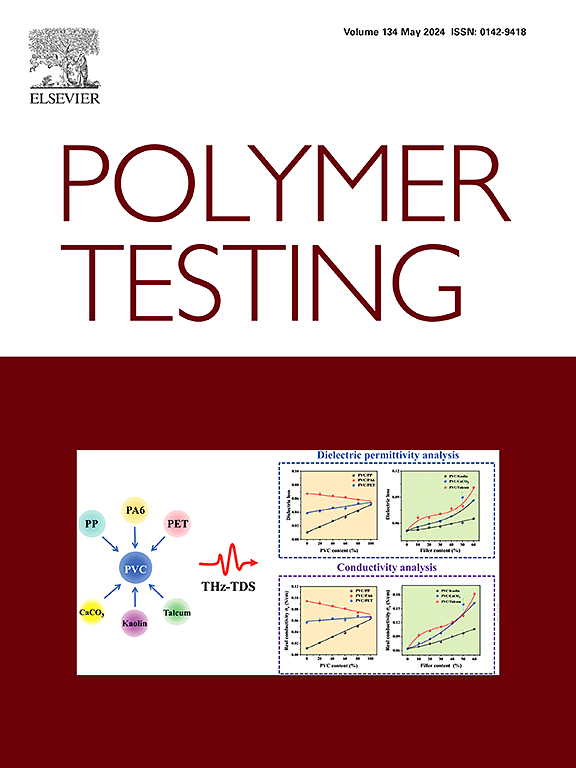Inverse vulcanized sulfur-styrene polymers as effective plasticizers for polystyrene
IF 5
2区 材料科学
Q1 MATERIALS SCIENCE, CHARACTERIZATION & TESTING
引用次数: 0
Abstract
Inverse vulcanized polymers have demonstrated significant potential as alternatives to conventional petrochemical polymers in various applications, including environmental remediation, where they are used to absorb heavy metals and pollutants from water and soil, and energy devices, such as in the development of high-capacity lithium-sulfur batteries. Despite their promise in these areas, the full application scope of these sulfur-based polymers remains unexplored. There is substantial potential for their use in other fields, such as advanced material coatings, medical devices, and as additives to improve the properties of existing polymers, yet these possibilities have not been thoroughly investigated. This study presents a sulfur-based polymer, synthesized via the inverse vulcanization of sulfur and styrene and partially crosslinked with divinylbenzene, as a novel plasticizer for polystyrene (PS). This polymer blend was prepared using an internal mixer to replace conventional organic-based plasticizers. The selected system was designed to maximize miscibility. Both virgin and plasticized PS were injection molded for comprehensive characterization. Differential Scanning Calorimetry (DSC) confirmed the complete consumption of sulfur, revealing a significant reduction in the glass transition temperature of PS upon the addition of the sulfur-based plasticizer. Morphological analysis showed a homogeneous surface with uniform single-phase morphology, indicating full miscibility of the blend. Tensile tests demonstrated enhanced ductility and reduced stiffness in plasticized PS, with strain at maximum tensile strength and elongation at break increasing by 22.0 % and 28.1 %, respectively. The plasticizer also improved the toughness of PS by 25.2 %. Rheological assessments corroborated the plasticization effect and confirmed the blend's full miscibility. Contact angle measurements indicated increased hydrophilicity of the plasticized PS samples. This newly developed sulfur-based plasticizer proved to be highly effective for PS, showcasing competitive efficiency comparable to commercial plasticizers. This advancement paves the way for new applications in the expanding field of sulfur-based polymers.
反硫化硫-苯乙烯聚合物作为聚苯乙烯的有效增塑剂
反硫化聚合物作为传统石化聚合物的替代品,在各种应用领域都显示出巨大的潜力,包括环境修复(用于吸收水和土壤中的重金属和污染物)和能源设备(如开发高容量锂硫电池)。尽管硫基聚合物在这些领域大有可为,但其全部应用范围仍有待开发。它们在先进材料涂层、医疗设备以及作为添加剂改善现有聚合物性能等其他领域的应用潜力巨大,但这些可能性尚未得到深入研究。本研究介绍了一种硫基聚合物,它是通过硫和苯乙烯的反硫化反应合成的,并与二乙烯基苯部分交联,可作为聚苯乙烯(PS)的新型增塑剂。这种聚合物混合物是用内部混合器制备的,以取代传统的有机基增塑剂。所选体系的设计旨在最大限度地提高混溶性。原始聚苯乙烯和增塑聚苯乙烯均已注塑成型,以进行综合表征。差示扫描量热法(DSC)证实了硫的完全消耗,并显示添加硫基增塑剂后 PS 的玻璃化转变温度显著降低。形态分析表明,混合物表面均匀,具有一致的单相形态,表明混合物具有完全的相溶性。拉伸试验表明,塑化 PS 的延展性增强,硬度降低,最大拉伸强度应变和断裂伸长率分别增加了 22.0% 和 28.1%。增塑剂还使 PS 的韧性提高了 25.2%。流变学评估证实了增塑效果,并确认了混合物的完全相溶性。接触角测量结果表明,增塑 PS 样品的亲水性增强。事实证明,这种新开发的硫基增塑剂对 PS 非常有效,其竞争效率可与商用增塑剂相媲美。这一进步为硫基聚合物领域的新应用铺平了道路。
本文章由计算机程序翻译,如有差异,请以英文原文为准。
求助全文
约1分钟内获得全文
求助全文
来源期刊

Polymer Testing
工程技术-材料科学:表征与测试
CiteScore
10.70
自引率
5.90%
发文量
328
审稿时长
44 days
期刊介绍:
Polymer Testing focuses on the testing, analysis and characterization of polymer materials, including both synthetic and natural or biobased polymers. Novel testing methods and the testing of novel polymeric materials in bulk, solution and dispersion is covered. In addition, we welcome the submission of the testing of polymeric materials for a wide range of applications and industrial products as well as nanoscale characterization.
The scope includes but is not limited to the following main topics:
Novel testing methods and Chemical analysis
• mechanical, thermal, electrical, chemical, imaging, spectroscopy, scattering and rheology
Physical properties and behaviour of novel polymer systems
• nanoscale properties, morphology, transport properties
Degradation and recycling of polymeric materials when combined with novel testing or characterization methods
• degradation, biodegradation, ageing and fire retardancy
Modelling and Simulation work will be only considered when it is linked to new or previously published experimental results.
 求助内容:
求助内容: 应助结果提醒方式:
应助结果提醒方式:


